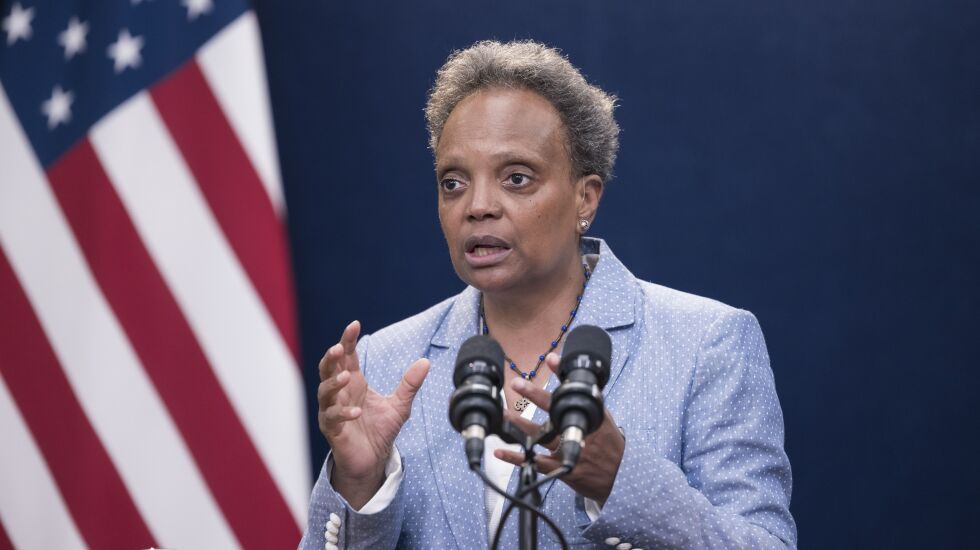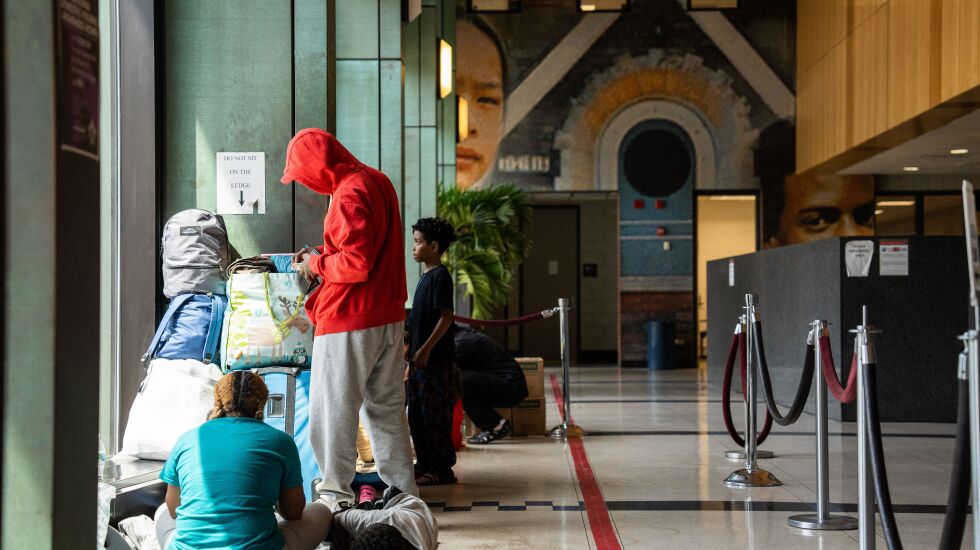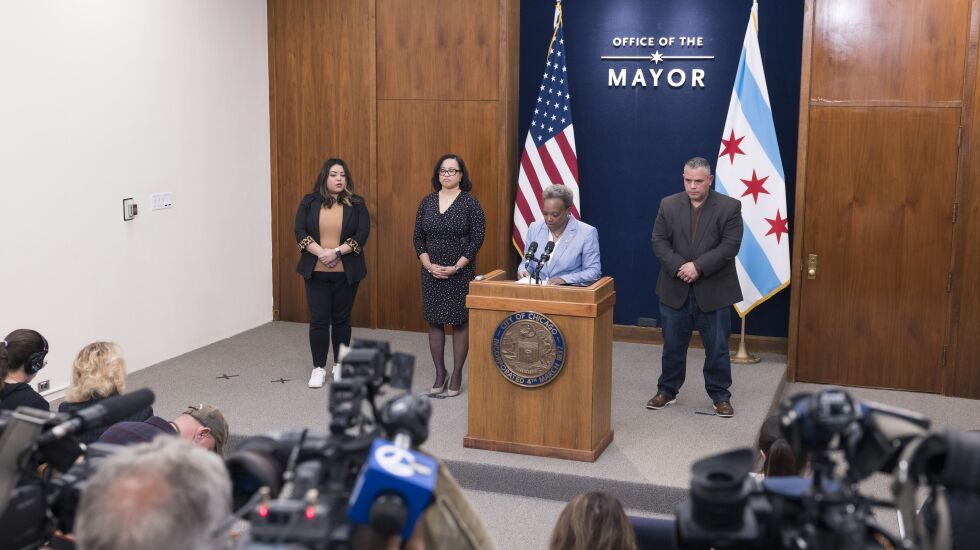
Claiming Chicago’s migrant crisis has reached “a breaking point,” Mayor Lori Lightfoot on Tuesday issued an emergency declaration as the city tries to deal with a surge of new arrivals in recent weeks.
The migrants, asylum-seekers and others, with many families among them, include another 48 people “inhumanely” bused here by Texas Gov. Greg Abbott, arriving Tuesday, according to Lightfoot.
Though Chicago welcomes new arrivals, “we’ve reached a breaking point” with a new surge expected later this week, Lightfoot said at an afternoon news conference. Border controls imposed during the pandemic expire.
The crisis has been manufactured by Abbott “for cynical political purposes,” Lightfoot said, adding that Abbott is “unable to see the humanity” of those he puts on buses and sends North.
“We are running out of spaces,” she said — or, specifically, suitable spaces.
Many continue to stay at police stations, though “we are trying to move them out as expeditiously as we can,” she said.
As she has from the beginning, Lightfoot argued the “national challenge” requires a “national solution” that only the federal government and Congress can engineer.

By that, the mayor means not simply a new federal immigration policy and a whole lot more money than the paltry $4 million approved by FEMA last week. She means allowing able-bodied asylum-seekers to receive expedited work permits.
“If we could put people to work legally, it would lessen the strain on all of our resources,” Lightfoot said. “There’s a shortage of employees all across the nation. ... If they are able to go out and work and take care of themselves and pay for housing, it will solve a lot of the challenges we are seeing.”
North Side 49th Ward Ald. Maria Hadden has suggested using McCormick Place or Navy Pier to shelter migrants.
But Lightfoot categorically ruled out those options.
“It doesn’t make any sense to shut down McCormick Place and Navy Pier that are huge economic drivers in the city that have conventions and meetings already booked out through next year. That’s simply not a viable option,” she said.
In a desperate search for shelter space, the city has looked at “every available big-box store,” the mayor said, but space alone is not the only issue. What’s needed is space “where we can manage a population humanely” with washrooms, showers and cooking facilities, she said.
“We’re not just warehousing people. We’re not gonna treat them in the same way we’ve seen Gov. Abbott do, without any regard for their humanity,” the mayor said.
For the thousands of new arrivals, the emergency declaration should mean faster allocation of services and resources, said Ere Rendon, vice president of immigrant justice at the Pilsen-based Resurrection Project.
Organizations and community groups also need financial resources to continue helping new arrivals, she said. Last fall, Resurrection Project staff met new arrivals at bus stations, but the organization now focuses on providing legal services to those who stayed in Chicago, Rendon said. They would have to hire more staff to resume conducting intakes of new arrivals.
All told, the city, with help from Cook County and the state of Illinois, has provided emergency care for over 8,000 new arrivals since last August, according to the mayor’s office. To handle the recent surge, the city has relied on various departments as well as community-based organizations to provide temporary shelters and respite centers.
The city also continues to seek additional funds from the state and federal governments.
llinois is providing Chicago directly with $30 million for the fiscal year, according to the governor’s office.
In addition, the state is contracting with Catholic Charities and New Life Centers to provide case management services to those staying at city-run shelters so they can find permanent housing or relocate closer to relatives living in another part of the country, according to a memo from the Illinois Department of Human Services. The state is also providing emergency rental assistance to the asylum-seekers so they can move out of the city-run shelters.
Sally Blount, the president and CEO of Catholic Charities of the Archdiocese of Chicago, said they’ve helped resettled about 800 families into more permanent housing, which includes many who arrived in the fall.
But Blount said it could be costly to provide basic necessities like food while also helping the immigrants transition into permanent housing.
“It does take money and it does take resources, and I think that we need legislatures to understand that and we just need citizens to understand that,” Blount said.
Veronica Castro, the deputy director of the Illinois Coalition for Immigrant and Refugee Rights, said the emergency declaration also highlights the need for better coordination among the city, state and federal level.
Castro said the state coordinated an effort that involved community organizations providing case management for those who ended up at hotels around Chicago, and about 2,000 of those asylum seekers have since transitioned into permanent housing. The hotels are no longer being used as of earlier this month, she said.
“We have this infrastructure of over 20 organizations that have been providing that case management, and they have over 50 case managers who have been the ones directly working the individuals day in and day out for the last eight months,” Castro said. “So that infrastructure is still there, and we’re now figuring out how to transition that in order to provide those services and the support to the wider set of folks that are now arriving.”
Lightfoot’s decision to declare a state of emergency follows a sometimes contentious City Council hearing Tuesday at which the Budget Committee voted to earmark $51 million in 2021 surplus funds to cover a shortfall in city spending for the migrant crisis.
The two-hour hearing featured familiar arguments about alderpersons being blindsided by the arrival of asylum-seekers in their wards and complaints that the $51 million spent to feed and house immigrants would be better spent on Chicagoans in long-neglected neighborhoods.
Three alderpersons voted against the funding transfer, which is less than half the $112 million the city needs through the end of June: 17th Ward Ald. David Moore, 38th Ward Ald. Nick Sposato and 41st Ward Ald. Anthony Napolitano.

Lightfoot said she plans to send those naysayers a copy of the budget they voted for, which includes “historic levels” of spending to reduce homelessness, build affordable housing and create jobs and recreational programs for young people.
“We’re not short-circuiting anyone. We are doing what we need to do,” Lightfoot said.
“I understand the concern. Some of it is rhetoric. ... I don’t want anybody to leave here today — anybody within the sound of my voice — thinking that, somehow, we’re short-circuiting Chicagoans because we are simply not,” said the mayor.
The mayor’s declaration empowers the chief procurement officer with sweeping purchasing powers similar to those granted to that department during the pandemic.
It directs city department heads to “undertake whatever efforts are feasible pursuant to their powers and duties and to direct their employees accordingly to manage this declared emergency.”
The mayor’s order also holds out the possibility of a request for additional state help.
“I reserve the authority to request the Governor of the State of Illinois to mobilize the National Guard to provide staffing and logistical support to address this emergency in the city of Chicago,” the declaration states.
Throughout her tenure, Lightfoot has been reluctant to use the National Guard for the symbolism it carries and the out-of-control state that it implies.
The mayor said she won’t hesitate to do it in her final days and hours in office. But she warned, the National Guard is “not a panacea.”
“They have limited abilities. They have limited durations of time that they can be in a place. It’s a resource that is available. But we’ve got to use that resource wisely, and it’s not gonna solve the challenge in the long term,” the mayor said.
“Maybe we get 30, 40 people for a short period of time. ... But it’s not a long-term solution. ... The circumstances here would be for them to come in and help support with staffing and with logistics. We’re not at that point yet,” she said.
In a statement, Gov. J.B. Pritzker’s office confirmed that Lightfoot’s office had not yet requested assistance from the National Guard.
“Our administration is working with community-based partners, caseworkers, and our partners in government to ensure asylum seekers are provided with case management and housing assistance with an eye toward successful resettlement. The Governor is committed to pursuing every available option to assist people who have traveled for months to flee oppression in search of opportunity,” according to the statement.
At a joint City Council committee hearing late last month, alderpersons were told Chicago is out of money, space and time to handle the humanitarian crisis caused by asylum-seekers descending on the city, with 40,000 people waiting at the border and a surge that has yet to peak.
The calamity is so dire — with young families sleeping on the floors of police stations and “walk-ins” rising from 10 to 125 a day — the city is now being forced to make “hard decisions” that include taking Brands Park Field House and Leone Beach Field House offline and using shuttered South Shore High School as emergency shelter for asylum-seekers.
Lightfoot acknowledged “hundreds” of migrants are still sleeping on the floors of Chicago’s police district stations as they await “more appropriate housing.”
“This crisis is not only exhausting our city’s resources. But it’s flat-out dangerous for the individuals and families who have been wrapped up in this political stunt,” she said.
“Sadly, we don’t expect the buses to stop arriving anytime soon,” said Lightfoot.
With Lightfoot leaving office Monday, the migrant crisis and the logistical and funding nightmare that it has caused Chicago will be Mayor-elect Brandon Johnson’s to solve.
Lightfoot said that’s why the Budget Committee was asked to approve enough money to get Chicago through June. It buys “breathing room” for her successor and his top aides to “get their arms around” the crisis and make some of what top mayoral aides called those “hard decisions.”
After all, Lightfoot said, “this issue is gonna come up again in the not-too-distant future.”







